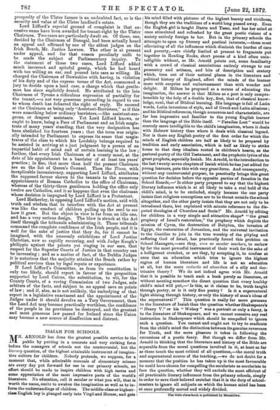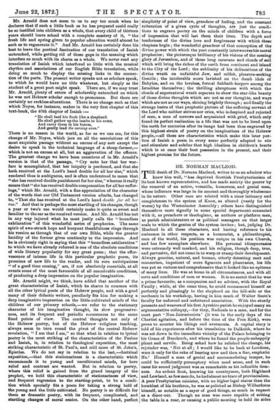ISAIAH FOR SCHOOLS.
MR. ARNOLD has done the greatest possible service to the public by putting in a concrete and very striking form before the managers of schools not the controversial, but the literary question, of the highest attainable instrument of imagina- tive culture for children. Nobody pretends, we suppose, for a moment that, while admirable manuals of elementary science are every day put forward for use in our primary schools, no effort should be made to inspire children with high tastes and some appreciation of the most impressive parts of the world's literature. No education, call it secular or what you will, that is worth the name, omits to awaken the imagination as well as to in- form the understandings of children. The middle-class or highest- class English boy is plunged early into Virgil and Homer, and gets
his mind filled with pictures of the highest beauty and vividness, though they are the traditions of a world long passed away. Even
The little class-book is published by Macmillan.
Mr. Arnold does not seem to us to say too much when he declares that if such a little book as he has prepared could really be so instilled into children as a whole, that every child of thirteen years should leave school with a complete mastery of it, "the fresh life and spring given to popular education would almost be such as to regenerate it." And Mr. Arnold has certainly done his beet to leave the poetical fascination of our translation of Isaiah untouched, while getting rid of those gaps in the meaning which interfere so much with its charm as a whole. We never read any translation of Isaiah which interfered so little with the musical rhythm and associations of our English Bible translation, while doing so much to display the missing links in the connec- tion of the parts. The present writer speaks not as scholars speak, to which he would have no title whatever, but simply as the student of a great poet might speak. There are, if we may trust Mr. Arnold, plenty of errors of scholarship untouched on which he was not Hebrew scholar enough to pronounce. But there are certainly no reckless alterations. There is no change such as that which Noyes, for instance, makes in the very first chapter of this text-book, the 40th chapter of Isaiah :—
" He shall feed his flock like a shepherd. He shall gather up the lambs in his arms, And carry them in his bosom, And gently lead the nursing ewes."
There is no reason in the world, as far as we can see, for this change of Mr. Noyes, which jars on all the associations of this most exquisite passage without an excuse of any sort except the desire to speak in the technical language of a sheep-farmer,- which is not an excuse at all, but an aggravation of the offence. The greatest change we have been conscious of in Mr. Arnold's version is that of the passage, "Cry unto her that her war- fare is accomplished, that her iniquity is pardoned, and that she bath received at the Lord's hand double for all her sins," which rendered thus is ambiguous, and is often understood to mean that "she has received double punishment for her sins," whereas it really means that "she has received double compensation for all her suffer-
ings," which Mr. Arnold, with a fine appreciation of the character of the words that our Old Testament version admits, has changed to, "That she has received at the Lord's hand double for all her rue." And that is perhaps the most startling of his changes, though a year or two's use would certainly make it quite as sweet and familiar to the ear as the received version. And Mr. Arnold has not in any way injured what he most justly calls the "boundless exhilaration" of this wonderful series of prophecies. The same spirit of awe-struck hope and buoyant thankfulness rings through his version as through that of our own Bible, while the greater lucidity of the former gives continuity to the impression. And he is obviously right in saying that this "boundless exhilaration" to which we have already referred is one of the absolute conditions of wide literary popularity for any great poem ; that the effer- vescence of intense life in this particular prophetic poem, its promises of new life to the reader, and its sure anticipations "of a good time coming," are, if not absolutely essentials, at all events some of the most favourable of all conceivable conditions, of producing a deep impression on the popular imagination.
Mr. Arnold might, we think, have added that another of the great characteristics of Isaiah, which he shares in common with all the other lyrical poets of the Hebrew people, and with a good many of their didactic writers, peculiarly fits him for making a deep imaginative impression on the little-cultivated minds of the children of our primary schools,—we refer to the stationary character of his imaginative thought, its slow progressive- ness, and its frequent and periodic recurrences to the same fixed points of view. The central • thoughts not only of the Hebrew poetry, but of the Hebrew • religious teaching, always seem to turn round the pivot of the central Hebrew revelation, "I am that I am," so that what in relation to lyrical poetry is the most striking of the characteristics of the Psalms and Isaiah, is, in relation to theological exposition, the most striking characteristic of St. Paul's, and still more of St. John's, Epistles. We do not say in relation to the last,—doctrinal exposition,—that this stationariness is a characteristic which recommends it to young and uncultivated minds, for here relief and contrast are wanted. But in relation to poetry, where this relief is gained from the grand imagery of the prophet, we hold this characteristic of stationariness of view, and frequent regression to the starting-point, to be a condi- tion which specially fits a poem for taking a strong hold of the young and the little cultivated. No poetry is so difficult for them as dramatic poetry, with its frequent, complicated, and startling changes of moral centre. On the other hand, perfect simplicity of point of view, grandeur of feeling, and the constant reiteration of a given cycle of thoughts, are just the condi- tions to engrave poetry on the minds of children with a force of impression that will last them their lives. The depth and tenderness of the divine love and forgiveness with which these chapters begin ; the wonderful grandeur of that conception of the divine power with which the poet constantly interweaves his moral prophecies ; the picturesque brilliancy of his visions of the coming glory of Jerusalem, and of those long caravans and clouds of sail which will bring the riches of the earth from continent and island to the City of the Lord ; the sublimity of his delineations of the divine wrath on unfaithful Jew, and selfish, pleasure-seeking Gentile ; the intolerable scorn lavished on the dumb idols of Babylon, and on the loveless, formal Sabbath-keepers among the Israelites themselves ; the thrilling abruptness with which the clouds of supernatural wrath separate to show the star-like beauty of those divine thoughts which are not as our thoughts, and ways which are not as our ways, shining brightly through ; and finally the strange lustre of that prophetic picture of the suffering servant of the Lord who neither strives nor cries, who is despised and rejected of men, a man of sorrows and acquainted with grief, which only found its perfect realisation in a life that was not to be lived upon the earth for centuries after its image had been thus engraved by this highest strain of poetry on the imaginations of the Hebrew people,—all these are characteristics which make this later por- tion of Isaiah a poem in every sense perfectly adapted to stir and stimulate and subdue that high idealism in children's hearts which is at once their best possession in the present, and their highest promise for the future.



































 Previous page
Previous page